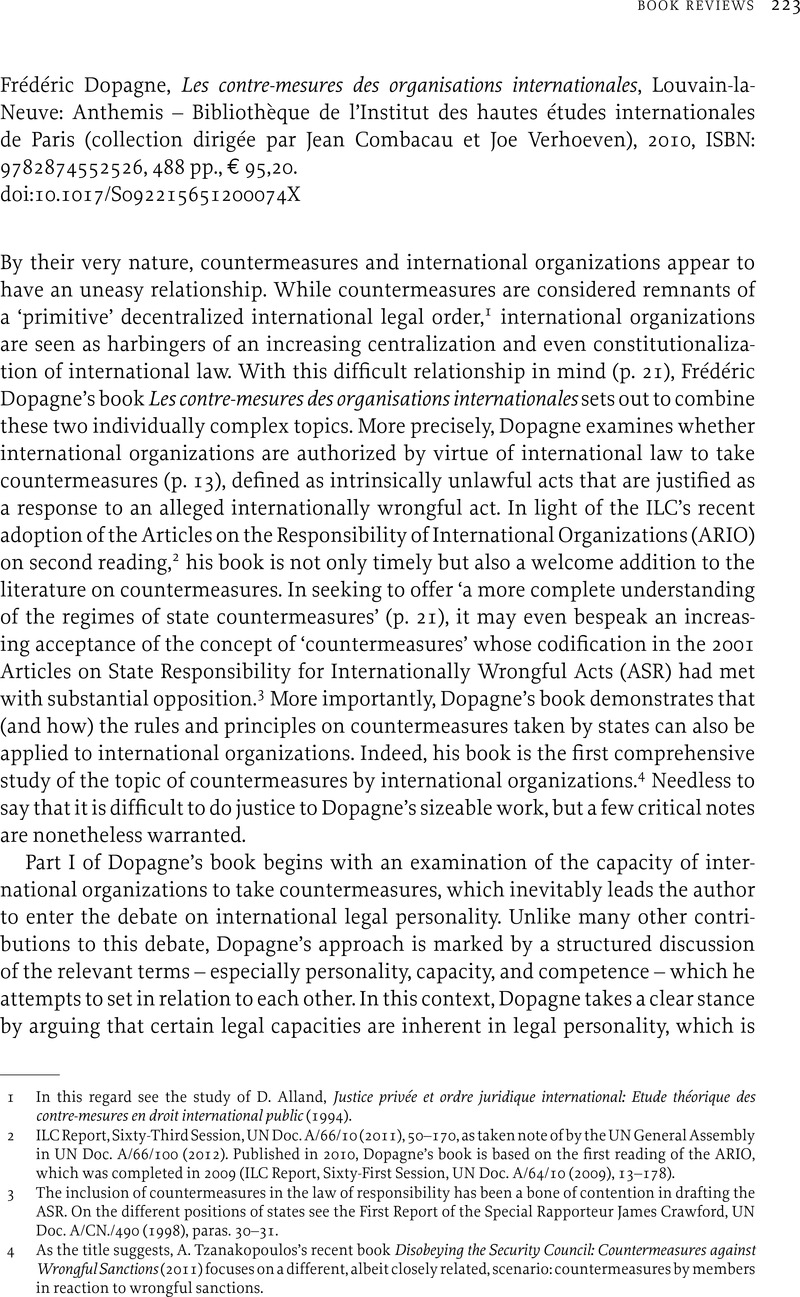Published online by Cambridge University Press: 05 February 2013

1 In this regard see the study of D. Alland, Justice privée et ordre juridique international: Etude théorique des contre-mesures en droit international public (1994).
2 ILC Report, Sixty-Third Session, UN Doc. A/66/10 (2011), 50–170, as taken note of by the UN General Assembly in UN Doc. A/66/100 (2012). Published in 2010, Dopagne's book is based on the first reading of the ARIO, which was completed in 2009 (ILC Report, Sixty-First Session, UN Doc. A/64/10 (2009), 13–178).
3 The inclusion of countermeasures in the law of responsibility has been a bone of contention in drafting the ASR. On the different positions of states see the First Report of the Special Rapporteur James Crawford, UN Doc. A/CN./490 (1998), paras. 30–31.
4 As the title suggests, A. Tzanakopoulos's recent book Disobeying the Security Council: Countermeasures against Wrongful Sanctions (2011) focuses on a different, albeit closely related, scenario: countermeasures by members in reaction to wrongful sanctions.
5 For an overview of the debate see Klabbers, J., Introduction to International Institutional Law (2009), 46–52CrossRefGoogle Scholar.
6 Sovereignty has been suitably described and discussed as an ‘essentially contested concept’ by D. Sarooshi in his study on International Organizations and Their Exercise of Sovereign Powers (2005), at 3–17.
7 See, for instance, Mosler, H., ‘Subjects of International Law’, in R. Bernhardt (ed.), Max Planck Encyclopedia of Public International Law, Vol. 7 (1984), at 442–59Google Scholar. See also Kelsen, H., Pure Theory of Law: Translated from the Second (Revised and Enlarged) German Edition by Max Night (2009)Google Scholar, at 148–9, observing the close kinship between the concepts of ‘capacity’ and ‘competence’ that both refer to legal power, used in the private- and public-law contexts, respectively.
8 Dopagne thereby relies on the Seventh Report on Responsibility of International Organizations by the Special Rapporteur, Giorgio Gaja, UN Doc. A/CN.4/610 (2009), FN 191.
9 See the Fourth Report on Responsibility of International Organizations by the Special Rapporteur, Giorgio Gaja, UN Doc. A/CN.4/564 (2006), para. 25. Although the special sapporteur ultimately suggested a set of draft Articles on countermeasures in his Sixth Report (see UN Doc. A/CN.4/597 (2008), paras. 40–66), the ILC remained divided on the issue in its deliberations (see Provisional Summary Record of the 2964th Meeting, UN Doc. A/CN.4/SR.2964 (2008), in particular at 20).
10 See Article 21 of the ARIO on first reading, which the ILC attenuated on second reading in Article 22 of the ARIO, requiring that countermeasures against members are explicitly provided for in the rules of the organization.
11 See, for instance, the Case No. C-162/96, A. Racke GmbH & Co. v. Hauptzollamt Mainz, [1998] ECR I-3655, discussed by Dopagne on p. 130.
12 This is not to say that an international organization cannot occasionally interact with its members in their capacity as states under international law, for instance when concluding an international agreement. On this crucial distinction see H. G. Schermers and N. M. Blokker, International Institutional Law (2011), at 1082 (para. 1688).
13 On this difficult distinction see Crawford, J. and Olleson, S., ‘The Exception of Non-Performance: Links between the Law of Treaties and the Law of State Responsibility’, (2001) 21 Australian Yearbook of International Law 55–74Google Scholar.
14 For critical discussion of constitutionalism in relation to international organizations see Klabbers, J., ‘Constitutionalism Lite’ (2004) 1 International Organizations Law Review 31–58CrossRefGoogle Scholar. On the two above-mentioned projects see, respectively, Kingsbury, B., Krisch, N., and Stewart, R. B., ‘The Emergence of Global Administrative Law’, (2005) 68 Law & Contemporary Problems 15–61Google Scholar; and von Bogdandy, A.et al. (eds.), The Exercise of Public Authority by International Institutions: Advancing International Institutional Law (2010)CrossRefGoogle Scholar.
15 B. Simma and D. Pulkowski, ‘Of Planets and the Universe: Self-Contained Regimes in International Law’, (2006) 17 EJIL 486, at 509 ff.